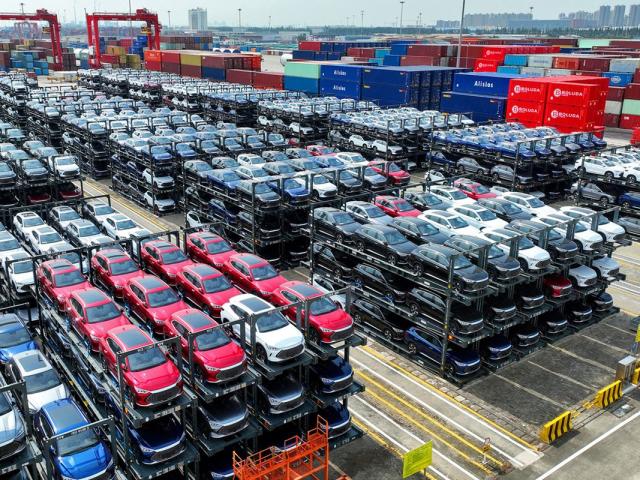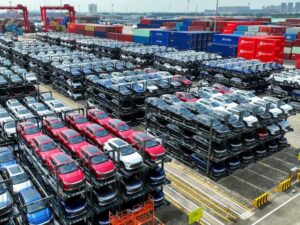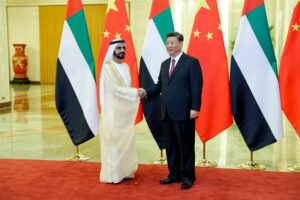Europe-China trade war threatens solar and electric vehicle industries
4 min read
The European Union’s relationship with China is under strain, particularly regarding clean energy technologies. Evidence of alleged government subsidies for Chinese electric vehicles and solar panel manufacturers has led the EU to consider imposing tariffs.
The European electric vehicle (EV) market has witnessed a rise in Chinese imports. This rapid growth has alarmed European policymakers, who are concerned about unfair competition due to alleged subsidies from the Chinese government. The European Commission launched an investigation in September 2023 and, based on “sufficient evidence”, is willing to impose countervailing duties.
This move could significantly affect Chinese exports of electric vehicles to the EU, a major market valued at $12.7 billion in 2023.
The solar panel industry has a similar story. Europe used to lead the production of solar panels, but China has since taken over and now dominates the global market. This decline is due to several factors, including lower production costs in China and an oversupply of panels. The United States imposed tariffs on solar panels made in China over similar concerns, but reversed its decision when the nation was unable to obtain enough panels to build its own solar infrastructure.
Potential impact of electric vehicle tariffs
If implemented, tariffs on Chinese electric vehicles would likely lead to price increases for European consumers. This could curb demand for electric cars, a crucial element in achieving the EU’s ambitious green goals. Additionally, European automakers with operations based in China could face retaliation through export restrictions, further hampering their businesses. The domino effect could spread globally, as other countries could follow suit with similar protectionist measures.
One potential risk facing European automakers could be Beijing’s decision to restrict access to supply chains for raw materials needed for batteries. The Chinese government has taken large stakes in materials processors and battery producers since it decided to invest heavily in building a domestic electric vehicle industry more than a decade ago. This control over raw materials gives China significant leverage in a trade war.
The rising tensions come at a particularly delicate time for German automakers. Volkswagen, a company that once played a key role in building China’s auto industry, faces stiff competition from domestic Chinese brands such as BYD. Internal software problems have also delayed the development of new electric models by Audi and Porsche.
Despite calls from the German government to diversify its automotive supply chains, Volkswagen has announced significant new investments in China. “With our ‘in China, for China’ strategy, we are fully integrating ourselves into China’s industrial ecosystem,” said Ralf Brandstätter, member of the board of management of Volkswagen AG for China. “This allows us to customize our products even faster to meet the needs of Chinese customers. In a dynamic market environment, a high pace of development is crucial for competitiveness.” This highlights the complex situation of German car manufacturers, caught between the demands of the EU and the lucrative Chinese market.
However, experts warn against overreacting. The economies of China and Europe are deeply intertwined and open hostility could harm both sides. China is Germany’s largest trading partner and is a key market for German companies to export goods and purchase materials.
The potential disruption to the global EV supply chain caused by EU import duties could also have consequences for the United States. A sudden influx of Chinese electric vehicles could flood the U.S. market, creating opportunities for consumers seeking lower prices but potentially hurting domestic manufacturing.
Solar eclipse for European manufacturers
The United States. It is also considering measures to boost its domestic solar industry, including prioritizing local production in energy auctions.
The case of Meyer Burger Technology, a leading solar company in Europe, exemplifies the crisis. Faced with a declining market and fierce Chinese competition, they are closing a major production facility in Germany and focusing on the US market. This decision highlights the struggle of European companies to compete and the potential job losses associated with a weakened domestic industry.
The Commission is exploring options such as energy auctions and prioritizing locally produced panels. However, the success of such measures still needs to be determined, and many experts believe a full revival of solar manufacturing in Europe is unlikely. Protecting domestic industries is a valid policy goal, but it should not come at the expense of clean energy goals and consumer affordability. Additionally, encouraging innovation and technological advances in Europe’s solar sector could help it compete more effectively with China.
Similarly, the US solar panel industry is in a precarious position due to China’s dominance. As in Europe, a flood of cheaper Chinese panels has put pressure on domestic manufacturers. This could worsen if EU sanctions divert more Chinese exports to the US market. While lower upfront costs for U.S. consumers may seem optimistic, they could cripple solar production capacity in the long term. Additionally, exploring free trade agreements with alternative solar panel producers outside of China could diversify the U.S. supply chain and reduce reliance on a single source.
The consequences of new tariffs for consumers, businesses and the environment require careful consideration. A solution is needed that encourages innovation, promotes sustainability and encourages collaboration. Only through a collaborative approach can Europe ensure a smooth transition to a cleaner future.






